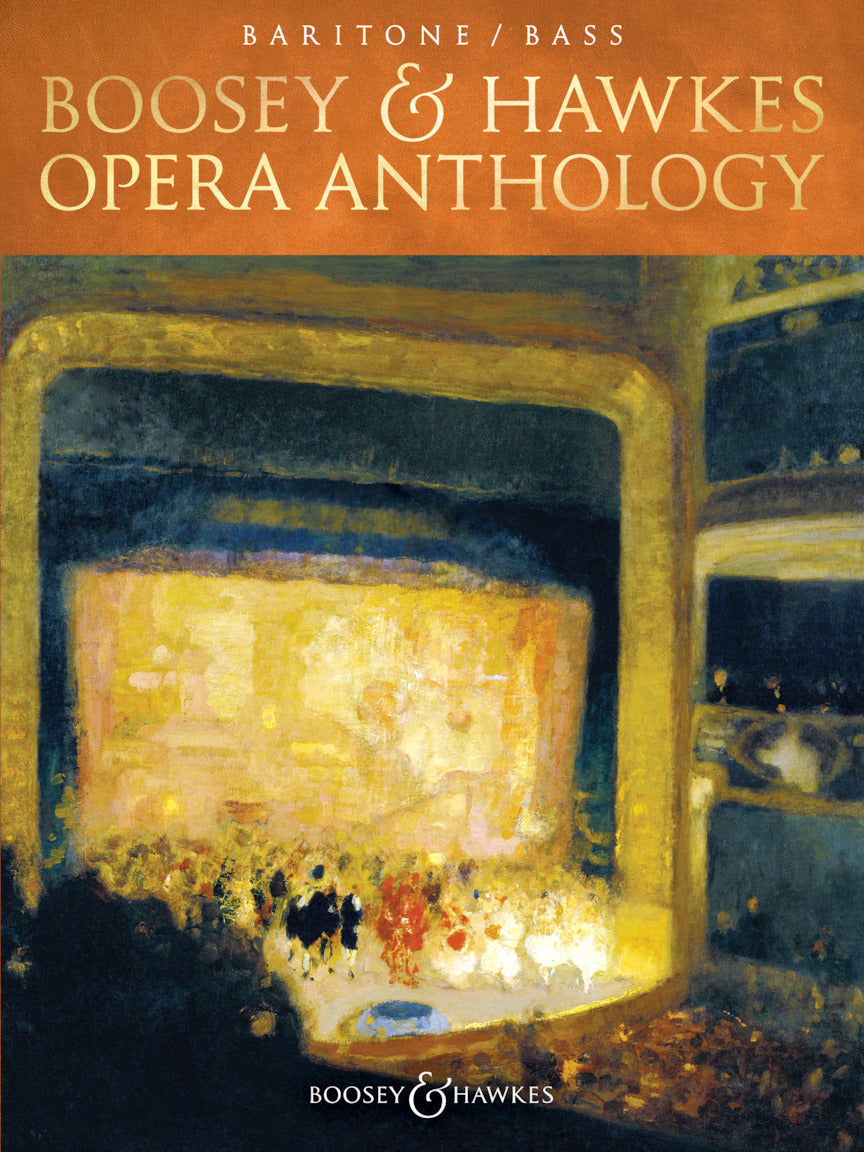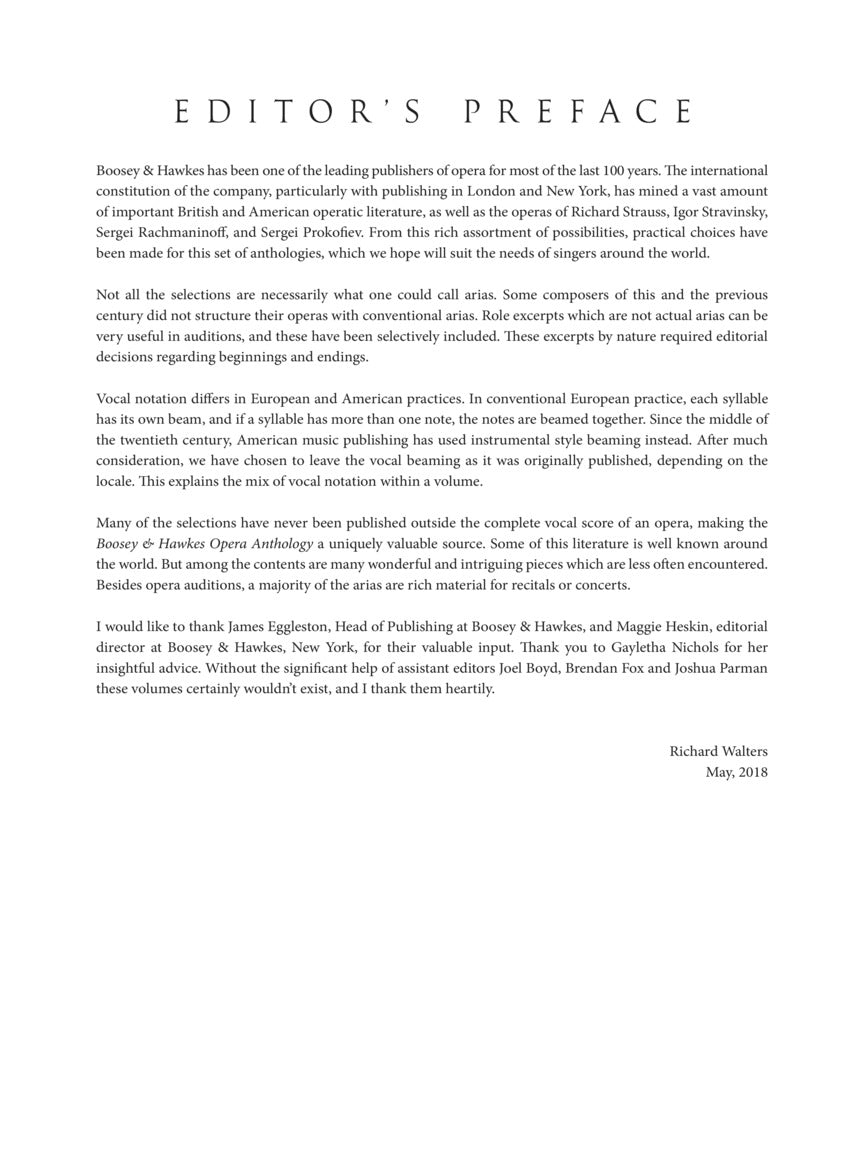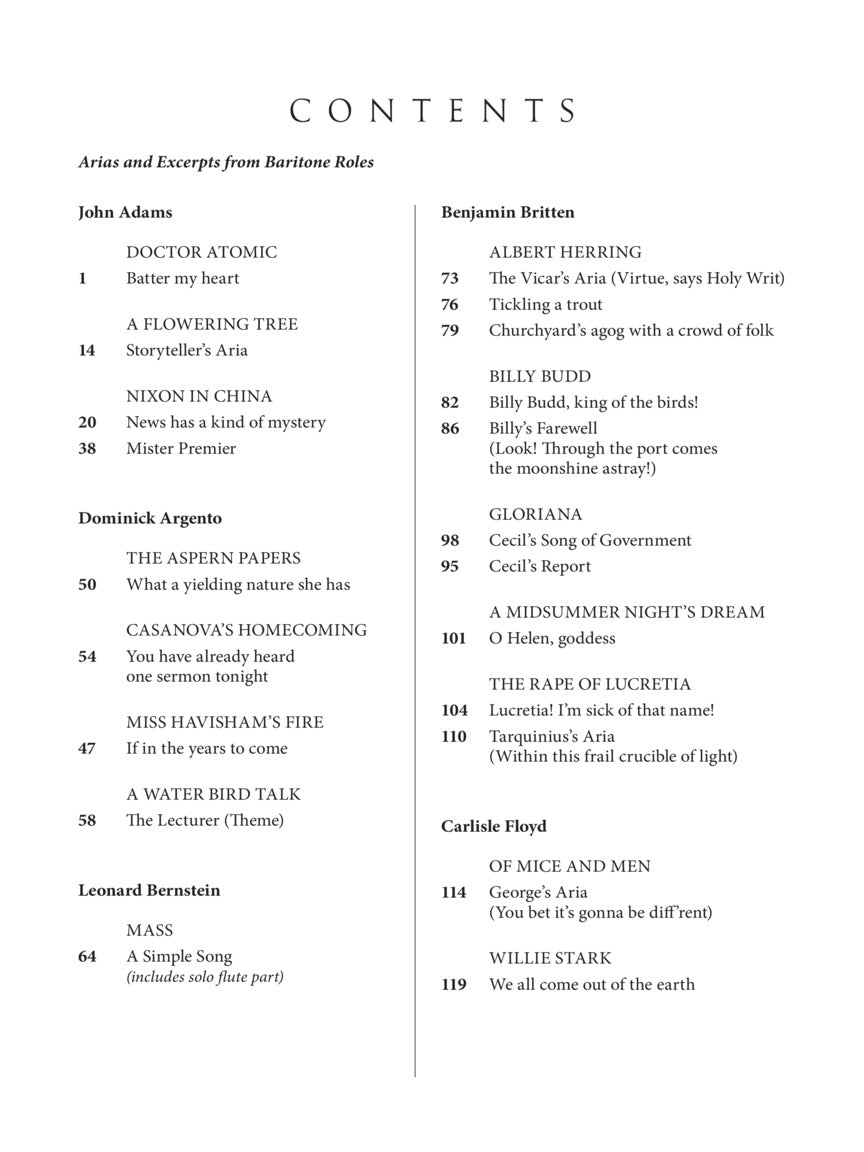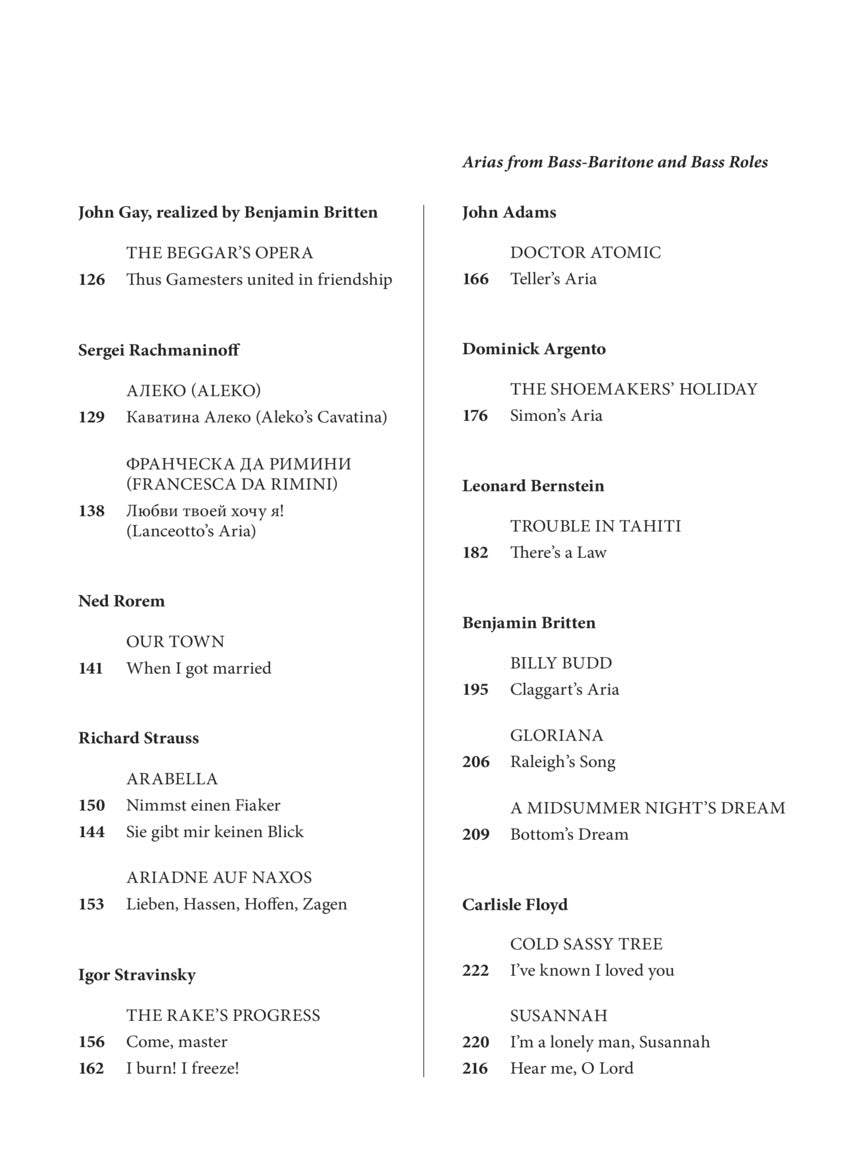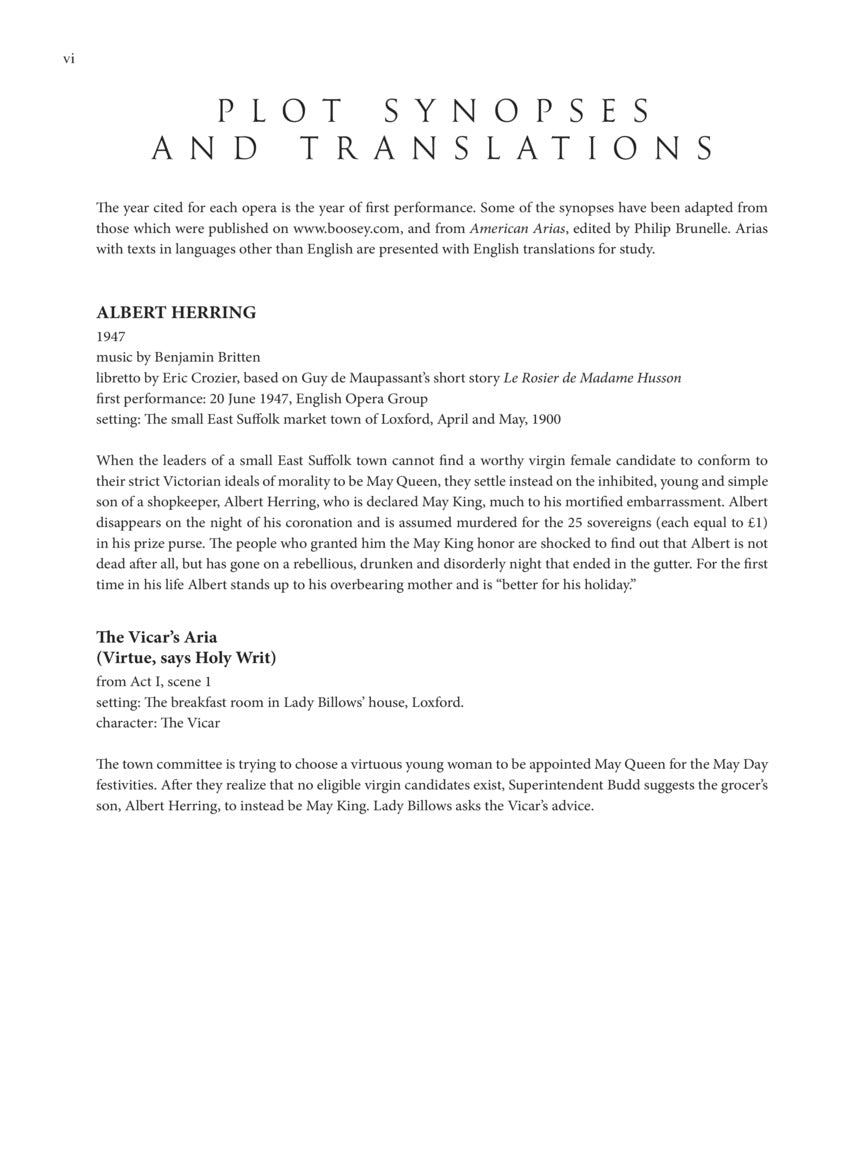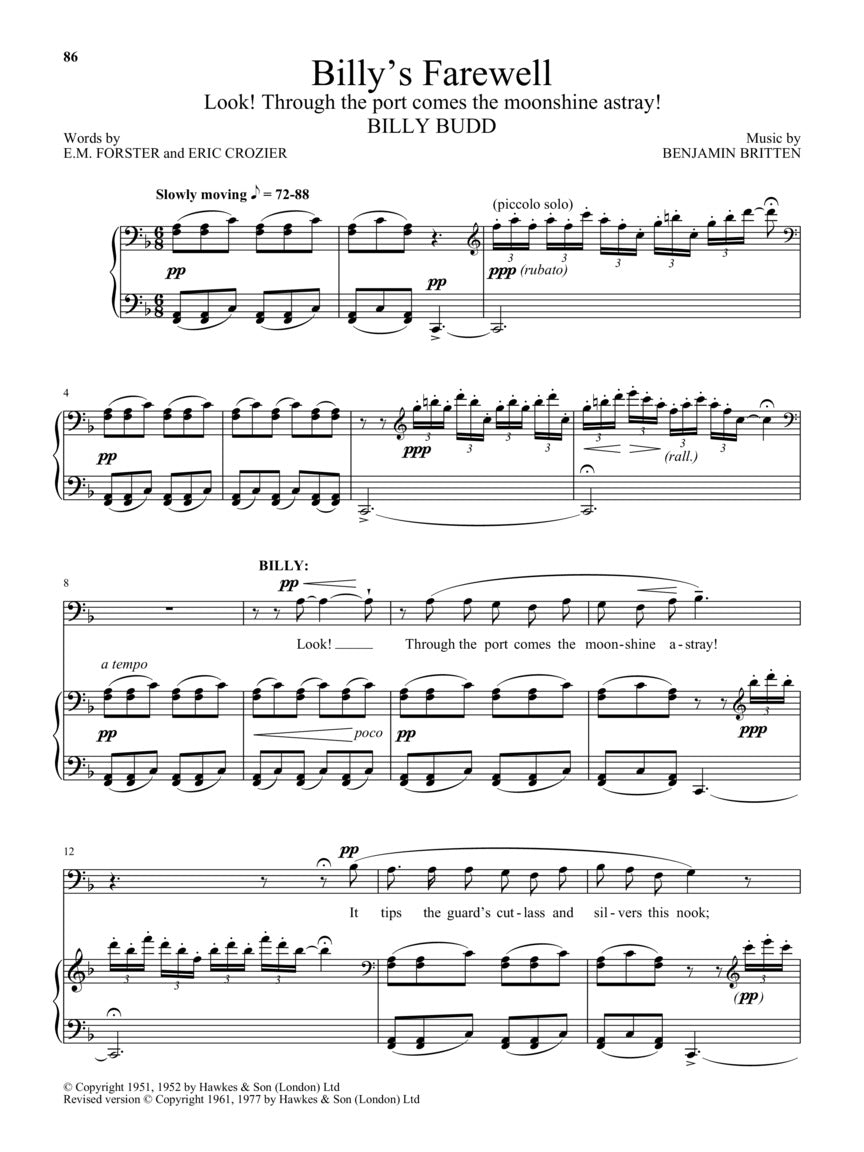Boosey & Hawkes Opera Anthology – Baritone/Bass
Expected to ship in 1-2 weeks.
- Composers: Benjamin Britten (1913-1976), Richard Strauss (1864-1949), Carlisle Floyd (1926-2021), Leonard Bernstein (1918-1990), Igor Stravinsky (1882-1971), John Adams (1947-), Sergei Rachmaninoff (1873-1943), Dominick Argento (1927-2019), Ned Rorem (1923-2022)
- Instrumentation (this edition): Piano Reduction, Baritone / Bass
- Originally for: SATB Choir, Orchestra, Opera
- Work Language: English
- ISMN:
- Size: 9.0 x 12.0 inches
- Pages: 258
Description
This landmark publication collects arias and role excerpts from operas by John Adams, Benjamin Britten, Carlisle Floyd, Richard Strauss, and many other composers published by Boosey & Hawkes. Includes extensive plot notes and translations. The baritone/bass volume also includes nine arias for bass or bass-baritone.
CONTENTS FOR BARITONE:
- John Adams: DOCTOR ATOMIC: Batter my heart
- A FLOWERING TREE: Storyteller's Aria
- NIXON IN CHINA: News has a kind of mystery
- Mister Premier
- Dominick Argento: THE ASPERN PAPERS: What a yielding nature she has
- CASANOVA'S HOMECOMING: You have already heard one sermon tonight
- MISS HAVISHAM'S FIRE: If in the years to come
- A WATER BIRD TALK: The Lecturer (Theme)
- Leonard Bernstein: MASS: A Simple Song
- Benjamin Britten: ALBERT HERRING: The Vicar's Aria (Virtue, says Holy Writ)
- Tickling a trout
- Churchyard's agog with a crowd of folk
- BILLY BUDD: Billy Budd, king of the birds!
- Billy's Farewell (Look! Through the port comes the moonshine astray!)
- GLORIANA: Cecil's Report Cecil's Song of Government
- A MIDSUMMER NIGHT'S DREAM O Helen, goddess
- THE RAPE OF LUCRETIA: Lucretia! I'm sick of that name! Tarquinius's Aria (Within this frail crucible of light)
- Carlisle Floyd: OF MICE AND MEN: George's Aria (You bet it's gonna be diff'rent)
- WILLIE STARK: We all come out of the earth
- John Gay, realized by Benjamin Britten: THE BEGGAR'S OPERA: Thus Gamesters united in friendship
- Sergei Rachmaninoff: ALEKO: Aleko's Cavatina
- FRANCESCA DA RIMINI: Lanceotto's Aria
- Ned Rorem: OUR TOWN: When I got married
- Richard Strauss: ARABELLA: Nimmst einen Fiaker
- Sie gibt mir keinen Blick
- ARIADNE AUF NAXOS: Lieben, Hassen, Hoffen, Zagen
- Igor Stravinsky: THE RAKE'S PROGRESS: Come, master
- I burn! I freeze!
CONTENTS FOR BASS-BARITONE AND BASS:
- John Adams: DOCTOR ATOMIC: Teller's Aria
- Dominick Argento: THE SHOEMAKERS' HOLIDAY: Simon's Aria
- Leonard Bernstein: TROUBLE IN TAHITI: There's a Law
- Benjamin Britten: BILLY BUDD: Claggart's Aria
- GLORIANA: Raleigh's Song
- A MIDSUMMER NIGHT'S DREAM: Bottom's Dream
- Carlisle Floyd: COLD SASSY TREE: I've known I loved you
- SUSANNAH: Hear me, O Lord
- I'm a lonely man, Susannah
Works:
- Batter my heart from J. Adams: Doctor Atomic
- Storyteller's Aria from J. Adams: A Flowering Tree
- News has a kind of mystery from J. Adams: Nixon in China
- Mister Premier from J. Adams: Nixon in China
- What a yielding nature she has from Argento: The Aspern Papers
- You have already heard one sermon tonight from Argento: Casanova's Homecoming
- If in the years to come from Argento: Miss Havisham's Fire
- Argento: The Lecturer (Theme) from A Waterbird Talk
- A Simple Song from Bernstein: MASS (A Theatre Piece for Singers, Players, and Dancers) (1971)
- Billy Budd, king of the birds! from Britten: Bill Budd, Op. 50
- Billy's Farewell (Look! Through the port comes the from Britten: Bill Budd, Op. 50
- The Vicar's Aria (Virtue, says Holy Writ) from Britten: Albert Herring, Op. 39
- Tickling a trout from Britten: Albert Herring, Op. 39
- Churchyard's agog with a crowd of folk from Britten: Albert Herring, Op. 39
- Cecil's Report Cecil's Song of Government from Britten: Gloriana, Op. 53
- O Helen, goddess from Britten: A Midsummer Night's Dream, Op. 64
- Lucretia! I'm sick of that name! Tarquinius's Aria from Britten: The Rape of Lucretia, Op. 37
- George's Aria (You bet it's gonna be diff'rent) from Floyd: Of Mice and Men
- Floyd: We all come out of the earth from Willie Stark
- Thus Gamesters united in friendship from Britten: Beggar's Opera, Op. 43
- Aleko's Cavatina from Rachmaninoff: Aleko (Алеко) (1892)
- Lanceotto's Aria from Rachmaninoff: Francesca da Rimini, Op. 25
- When I got married from Rorem: Our Town (2005)
- Nimmst einen Fiaker from Strauss: Arabella, TrV 263, Op. 79
- Sie gibt mir keinen Blick from Strauss: Arabella, TrV 263, Op. 79
- Lieben, Hassen, Hoffen, Zagen from Strauss: Ariadne auf Naxos, TrV 228, Op. 60
- Come, master from Stravinsky: The Rake's Progress (1951)
- I burn! I freeze! from Stravinsky: The Rake's Progress (1951)
Publishers use a lot of words to describe what they sell, and we know it can be confusing. We've tried to be as clear as possible to make sure you get exactly what you are looking for. Below are descriptions of the terms that we use to describe the various formats that music often comes in.
Choral Score
A score for vocalists that only contains the vocal lines. The instrumental parts are not there for reference. Generally, cheaper than a vocal score and requires multiple copies for purchase.
Facsimile
Reproductions of the original hand-written scores from the composer.
Full Score
For ensemble music, this indicates that the edition contains all parts on a single system (there are not separate parts for each player). In larger ensembles, this is for the conductor.
Hardcover
Hardbound. Generally either linen-covered or half-leather.
Orchestral Parts
Similar to a wind set, this is a collection of parts. In the case of strings, the numbers listed are the number of copies included, though generally these are available individually (often with minimum quantities required).
Paperback
When publishers offer multiple bindings (e.g. hardcover) or study scores, this is the "standard" version. If you're planning to play the music, this is probably what you want.
Performance / Playing Score
A score of the music containing all parts on one system, intended for players to share. There are not separate parts for each player.
Set of Parts
For ensemble music, this indicates that there are separate individual parts for each player.
Solo Part with Piano Reduction
For solo pieces with orchestra, this is a version that contains a piano reduction of the orchestra parts. For piano pieces, two copies are typically needed for performance.
Study Score
A small (think choral size) copy of the complete score meant for studying, and not playing. They make great add-ons when learning concertos and small chamber works.
Vocal Score
A score prepared for vocalists that includes the piano/organ part or a reduction of the instrumental parts.
Wind Set
For orchestral music, this is a collection of wind and percussion parts. The specific quantities of each instrument are notated.
With Audio
In addition to the printed music, the edition contains recordings of the pieces. This may be an included CD, or access to files on the internet.
With / Without Fingering (Markings)
Some publishers prepare two copies - a pure Urtext edition that includes no fingering (or bowing) suggestions and a lightly edited version that includes a minimal number of editorial markings.
